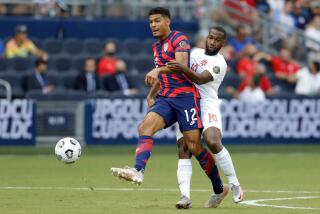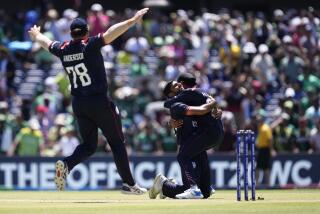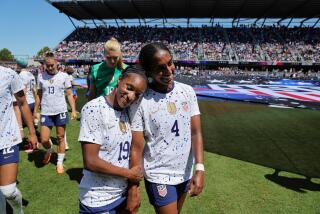Top U.S. Rugby Team Starts 7-Game Tour in South Africa
A high-level U.S. rugby team, with a majority of Southern Californian players, arrived in Johannesburg today for a seven-game series against some of South Africa’s best regional teams amid controversy within the U.S. national governing body.
Though few foreign teams have played in South Africa in recent years because of international sports boycotts imposed to protest the country’s policy of racial segregation, leaders of the U.S. team decided to make the trip after South African officials agreed to a number of stipulations, including scheduling matches against black and colored teams.
Dan Hickey, president of the Pacific Coast Rugby Football Union and a member of the U.S. Rugby Football Union’s board of directors, said Wednesday night that the all-star team, the Grizzlies, almost did not make the trip when the national board tried to revoke its sanction three days before the 32-person entourage departed.
Hickey, who said the tour caused much deliberations among the national board of directors, said a majority of the Grizzlies come from clubs in San Diego and Los Angeles. Nine members of the team played on the U.S. national team that competed in last year’s World Rugby tournament in Australia and New Zealand.
Hickey said the U.S. sends a team on an international tour once every two years to help develop players. He said South Africans who knew members of the U.S. national championship team, the Old Mission Beach Athletic Club, initiated the tour, which includes black American players.
The South African Rugby Board paid for the entire tour, one of the Grizzlies’ stipulations, Hickey said.
“We would not have gone to play a schedule that would match us against nothing but white teams,” Hickey said. “This puts us in a position to let the players learn for themselves what is going on in South Africa.”
When asked about possible repercussions, Hickey said the trip is a calculated risk. “I don’t sleep well these nights,” he said. “We hope intelligent, reasonable people understand what we’re trying to do. We can break the color lines through rugby . . . just like when they integrated the University of Mississippi.”
Hickey said that all-black South African rugby teams have played in the United States in past years.
The trip was originally approved by the U.S. national board last year, but as late as June some board members expressed reservations. The board eventually revoked its sanction of the trip, but Hickey said the Grizzlies were able to have the order rescinded by proving that it was not done within national charter guidelines.
“I’m grateful to these men for sticking their necks out to make this tour possible,” Danie Craven, president of the South Africa Rugby Board, told Associated Press.


